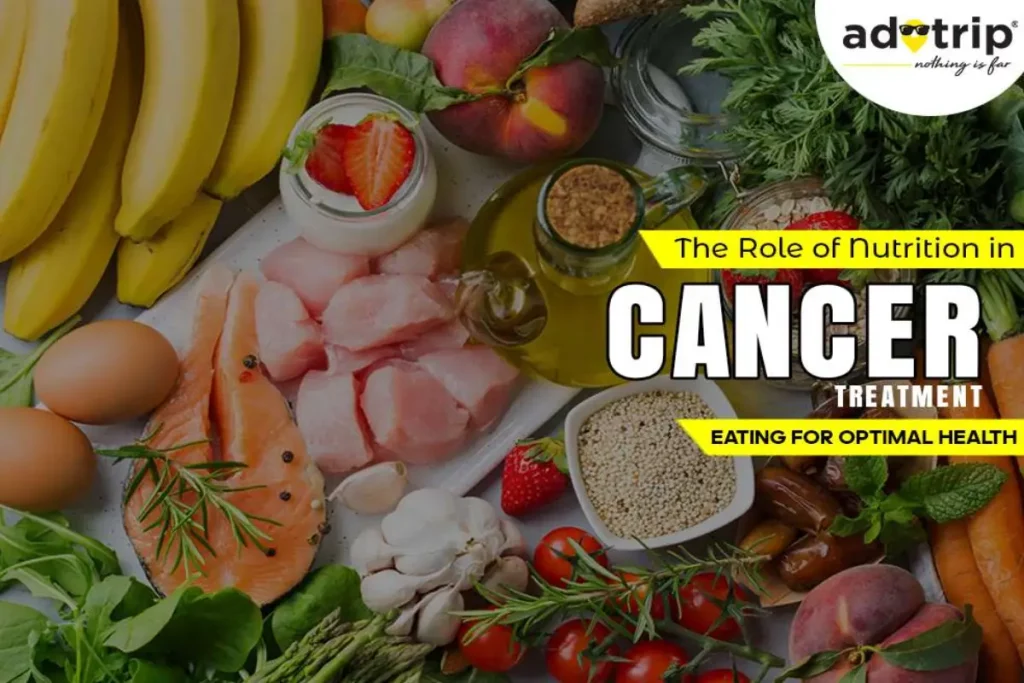Table of Contents
Introduction
Many people wonder if food plays a role in cancer treatment, what nutrients and naturals help fight cancer, and if antioxidants play a significant role in fighting cancer?
The answer to all questions is yes, as there is strong evidence that some types of fruits and vegetables rich in vegetables can be instrumental in preventing tumour growth from the outset.
In many types of fruits, vegetables and food, antioxidants are essential in reducing the likelihood of cancer, the most prominent of which are antioxidants:
Vitamin C.
Lycopene.
Beta Carotene.
The essential foods that have a role in cancer treatment. It was also previously stated that the role of nutrition in cancer treatment exists, and represents this role through several varieties, classified as follows:
1. Vegetables
Many vegetables play a role in contributing to cancer prevention and reducing the severity if infected, including:
broccoli, cauliflower, turnips, cabbages of all kinds
These varieties contain many anti-cancer substances, such as isothiocyanate, which has a role in preventing cancers in general and prostate cancer in particular and preventing its early development and development.
Dark Leafy Vegetables
Leafy vegetables, especially dark vegetables, contain a high amount of fibre, folic acid. And a wide range of carotenoid antioxidants, all of which play a significant role in the fight against cancer.
Among the most prominent leafy vegetables that include under the list of the role of food in cancer treatment:
Watercress:
Which has remained found to take daily, prevents the DNA of cells from damage and thus fights the formation of cancer cells.
Spinach:
Containing chlorophyllin chemicals can play a significant role in reducing the risk of liver cancer.
Lettuce:
Lettuce is one of the essential vegetables in food roles in cancer treatment.
Tomatoes
Tomatoes are effective in preventing cancer because they contain antioxidants known as lycopene, which are responsible for giving them red and flavonoids.
Lycopene has remained found to reduce the risk of many cancers, especially prostate, breast and lung cancer, and colon cancer.
Garlic and Onions
Garlic and onions are the most prominent foods that can remain on the list of food roles in cancer treatment, containing many anti-cancer substances, including glycine and selenium.
It has remained found to have antioxidant properties that play an active role in protecting against cancers, especially gastrointestinal cancers breast and prostate cancers.
Sweet Potatoes
Sweet potatoes contain beta-carotene antioxidants, which are very important in reducing the risk of infection, especially lung and colon cancer, breast, head, neck, prostate and stomach cancer.
Beta-carotene prevents certain cancers by strengthening white blood cells in the immune system that prevent and eliminate cell-damaging free radicals.
2. Fruits
The list of the role of food in cancer treatment is not over as fruits have a role in it. And one of the most prominent fruits contributing to the prevention and treatment of cancer is:
Pomegranate
Pomegranates contain many phytonutrients and antioxidants from flavonoids and polyphenols, which work together as a very effective ingredient to fight diseases, slowing the growth of cancer cells and thus reducing the risk of cancer, especially prostate cancer, breast cancer and lymphomas.
Grapefruit
Grapefruit contains vitamin c, an antioxidant found in many fruits and vegetables such as oranges, peppers, and cauliflower. Therefore, these foods are under the list of food roles in cancer treatment.
So, vitamin c helps prevent the formation of cancer-causing nitrogen compounds, as vitamin c has remained linked to reducing the risk of cancers. Such as stomach, colon, oesophagus and bladder cancers, breast cancer and cervix.
Berries and Grapes
Both grapes and cranberries contain potent antioxidants called Ellagic acid and an antioxidant called Pterostilbene, found in high quantities in berries, making it an anti-cancerous characteristic.
3. Grains
The role of food in cancer treatment is pervasive, as many foods help reduce the spread of cancer. And we mention them in the following:
Legumes:
Legumes such as beans, peas and lentils contain a good percentage of antioxidants as they are rich in vitamin E, one of the most potent antioxidants.
Soybeans:
Therefore, the active ingredient in soybeans is genistein, a plant estrogen that protects against cancer.
Peanuts:
It contains a high amount of vitamin e, a vitamin that reduces the risk of stomach, colon, lung and liver cancers and other types of cancers.
Flaxseeds:
Flaxseed is rich in omega-3 acids, which can help prevent cancer by inhibiting the proliferation and growth of cancer cells.
4. Spices and Herbs
Spices and herbs are classified as food in cancer treatment and are very effective in this regard, most notably.
Tea
It contains antioxidants and compounds that help stop the growth of cancer cells and prevent cellular mutations that contribute to cancer development. So drinking tea of all kinds, such as green tea, black and white, regularly may have a positive role in your life.
Turmeric
Turmeric contains the active substance curcumin, which acts as an anti-inflammatory and antioxidant, helping prevent cancer, especially breast, colon, stomach, liver and lung cancer.
5. Fish
Fish is a source of high-quality protein and a low-fat source, and salmon, in particular, is included in cancer prevention as it contains:
Vitamin D:
So, low vitamin D levels have remained linked to many cancers, including the colon and breast.
Omega-3:
Found to have a role in delaying or reducing breast and prostate cancer development.
So, after recognizing the list of the role of food in cancer treatment. It should remain remembered that an anti-cancer diet or the use of supplements does not mean that.
It is an alternative to recommended treatments for cancer, such as chemotherapy and radiation. But rather support medical cancer treatment and not replace it.
Also Read: Benefits and Reasons For Increased Water Drinking
